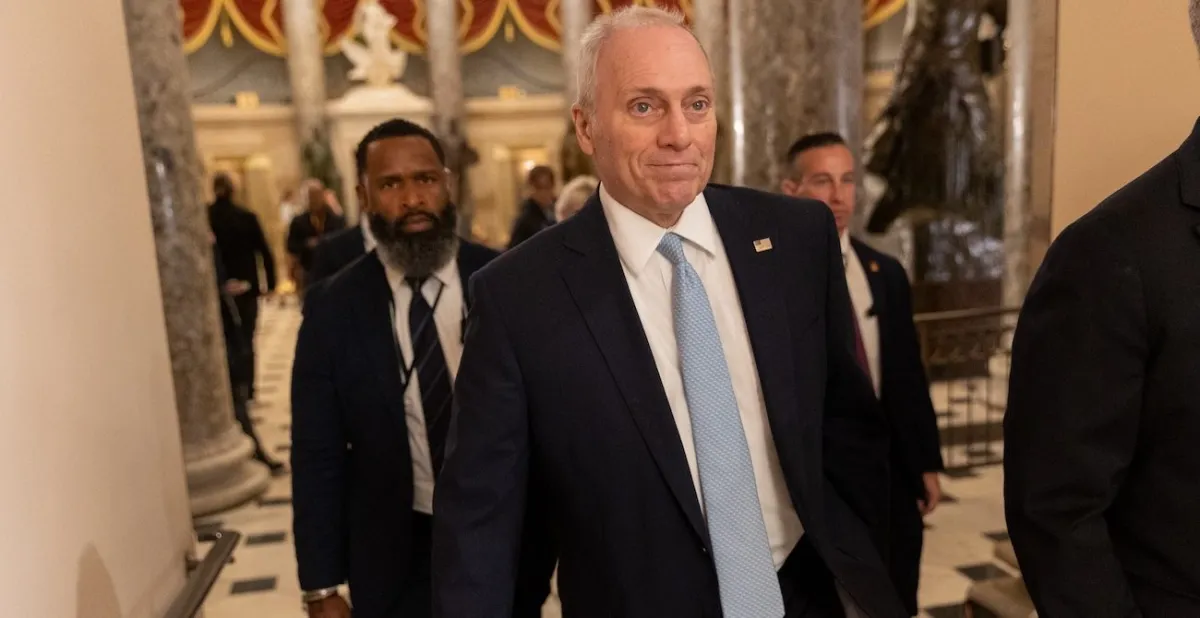GOP lawmakers try again to preempt state enforcement of AI laws

Federal lawmakers are again attempting to pass a moratorium on state laws that govern artificial intelligence, this time through language that would be included in the National Defense Authorization Act for 2026.
Rep. Steve Scalise, the House majority leader from Louisiana, told Punchbowl News on Monday that House GOP leaders are shopping language that would reintroduce a ban on enforcement of state AI laws, as they work on the 2026 NDAA. Lawmakers are set to finalize the bill by the end of this week. It is not uncommon for lawmakers to tuck seemingly unrelated legislation into the annual defense funding package.
The renewed effort to put a stopgap on state laws follows a failed attempt this year, when the Senate eventually voted 99-1 to remove a provision included in a broader, budget reconciliation bill — President Donald Trump’s “One Big Beautiful Bill” — that would have established a 10-year ban on state and local regulation of AI.
That measure, led by Sen. Ted Cruz, the lawmaker from Texas who claimed that allowing states to continue regulating AI would impede market growth, was met with immediate pushback. In addition to concern from privacy-advocacy groups, the measure also drew outcry from state attorneys general and more than 260 state legislators, who lambasted the measure as “reckless.” State legislators have this year introduced more than 1,000 AI-related bills. Hundreds more have been enacted over the last several years.
Despite that defeat, some Republicans have refused to give up the fight. In July, the Trump administration dropped its AI Action Plan, which also featured a proposal to revoke some states’ broadband funding if the federal government found states’ AI laws to be overly “burdensome.” That threat, however, has yet to materialize.
‘Poison pill’
Many state leaders have said localized efforts to codify protections from the potential harms of AI — such as such as deepfake scams, algorithmic discrimination and job displacement — are in response to the lack of federal action so far on regulating the burgeoning technology. A report published Wednesday by the Council of State Governments claimed AI is advancing far more rapidly than policy development is managing to keep up with, signaling potential gaps in protections, which states are attempting to fill.
While the details of the the Scalise-led moratorium proposal have yet to be released, experts are still weighing the potential impacts. Jonathan Walter, senior policy adviser at the Leadership Conference’s Center for Civil Rights and Technology, said that amid already hefty bipartisan opposition, he is skeptical of success this time around.
“I think just one of the things that makes this different, or kind of more galling, is they’re trying it again in the face of that opposition and outcry from state legislators, kids safety groups, consumer groups, civil rights groups, states’ rights-oriented organizations,” Walter said. “There’s really no argument to be made that this has anything to do with defense. And then there’s been very clear reporting that the tech companies are spending even more money lobbying, and so I think it’s also a reflection of just how big of a priority this is for the tech industry and what their lobbying dollars are going toward.”
Walter said that despite Scalise’s announcement, there hasn’t been much advocacy from prominent Republicans yet, such as Majority Leader John Thune or Speaker Mike Johnson.
President Donald Trump, though, did share his support for the effort on Truth Social Tuesday evening, writing, “Investment in AI is helping to make the U.S. Economy the ‘HOTTEST’ in the World, but overregulation by the States is threatening to undermine this Major Growth ‘Engine.’ Some States are even trying to embed DEI ideology into AI models, producing ‘Woke AI’ (Remember Black George Washington?). We MUST have one Federal Standard instead of a patchwork of 50 State Regulatory Regimes. If we don’t, then China will easily catch us in the AI race. Put it in the NDAA, or pass a separate Bill, and nobody will ever be able to compete with America.”
The Trump administration is also considering using an executive order to override state and local AI laws that could be conditioned around the receipt of federal grants. A draft order viewed by FedScoop includes plans to establish an AI litigation task force and restrict funding in states with “onerous” AI laws.
Democrats, too, are already responding to the prospective measure. Brian Schatz, a Democrat from Hawaii who sits on the Senate’s Commerce Committee, on Monday posted on X, calling it a “a poison pill,” and adding “we will block it.”
Inner-party strife
Though this year’s failed AI moratorium effort was led by GOP federal lawmakers, all senators except Cruz voted against including it in this summer’s spending package. The effort to strip it from the bill was led by Sen. Marsha Blackburn, a Republican from Tennessee, who critiqued the measure for its preemption of states’ ability to pass their own laws, especially when it comes to those designed to protect minors online.
Another defector, Rep. Marjorie Taylor Greene from Georgia — who was a staunch Trump loyalist until this summer when she began criticizing the president’s approach to foreign diplomacy, and, more recently, his handling of the Jeffrey Epstein scandal — in June wrote online that she was “adamantly OPPOSED” to the moratorium, claiming it was “a violation of state rights.”
That rift is continuing to foment amongst members of the Republican party who consider the new proposal. Florida Gov. Ron DeSantis, who has been critical of Trump on a number of items over the last several months, shared on X on Tuesday his critiques.
“Stripping states of jurisdiction to regulate AI is a subsidy to Big Tech and will prevent states from protecting against online censorship of political speech, predatory applications that target children, violations of intellectual property rights and data center intrusions on power/water resources,” DeSantis said. “The rise of AI is the most significant economic and cultural shift occurring at the moment; denying the people the ability to channel these technologies in a productive way via self-government constitutes federal government overreach and lets technology companies run wild. Not acceptable.”
Walter, the policy adviser, partially attributed the ideological divergence to evolving public opinion on the role of government. While the Republican party has traditionally viewed the role of government as small and limited, preferring to leave most decisions to state and local governments, Trump-aligned federal lawmakers have instead swung in the opposite direction, choosing to limit states’ rights in favor of Big Tech companies.
“On some level, I think it’s a reflection of what they are hearing from their constituents. … People across the spectrum are frustrated that there’s still people in Congress and the administration who want to cozy up to the tech companies and give them a free pass,” Walter said. “So I think the distinction is there are people on both sides of the aisle who are kind of more attuned to this frustration that that people have expressed, and others who are little more attentive to the interests of Big Tech.”






